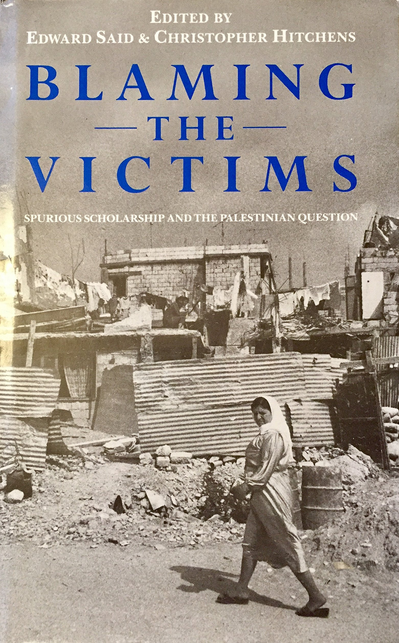Newly released
This book is new and will be uploaded as soon as it becomes available to us and if we secure the necessary publishing rights.

Blaming The Victims Book PDF
(0)
Author:
Christopher HitchensNumber Of Reads:
67
Language:
English
Category:
fieldsSection:
Pages:
302
Quality:
good
Views:
844
Quate
Review
Save
Share
Book Description
Blaming The Victims: Spurious Scholarship And The Palestinian Question
Since the 1948 war which drove them from their homeland, the Palestinian people have consistently been denied the most basic democratic rights. Blaming the Victims shows how the historical fate of the Palestinians has been justified by spurious academic attempts to dismiss their claim to a home within the boundaries of historical Palestine and even to deny their very existence.
Beginning with a thorough expose of the fraudulent assertions of Joan Peters concerning the indigenous inhabitants of Palestine prior to 1948, the book then turns to similar instances in Middle East research where the truth about the Palestinians has been systematically suppressed: from the bogus -- though still widely believed -- explanations of why so many Palestinians fled their homes in 1948, to today's distorted propaganda about PLO terrorism. The volume also includes sharp critiques of the wide consensus in the USA which supports Israel and its territorial ambitions while maintaining total silence about the competing reality of the Palestinians.
Christopher Hitchens
He is a British-American author, columnist, essayist, orator, literary and religious critic, social critic and journalist. Hitchens was the author, co-author, editor or co-editor of more than 30 books, including five collections of political, cultural, and literary essays. His polemical rhetoric made him a central topic of public discourse, resulting in him as an intellectual and controversial figure. Contributed to New Statesman, The Nation, The Weekly Standard, The Atlantic, London Review of Books, The Times Literary Supplement, Slate, Free Inquiry, and Vanity Fair. Describing himself as a democratic socialist, Marxist and anti-totalitarian, he broke with the political left after describing it as the "lukewarm reaction" of the Western left to the debate over The Satanic Verses, followed by the left's embrace of Bill Clinton and the anti-NATO war movement in Bosnia and Herzegovina in the 1990s.
The last century. His support for the war on Iraq further separated him. His writings included criticism of public figures such as Bill Clinton, Henry Kissinger, Mother Teresa and Diana, Princess of Wales. He was the older brother of conservative journalist and author Peter Hitchens. He also called for the separation of church and state. As a critic of divinity, he regards notions of a deity or a higher power as universalistic beliefs that restrict individual freedom. He advocated freedom of expression and scientific discovery, and that it trumps religion as a moral code of conduct for human civilization. His famous statement, "What can be affirmed without evidence can be denied without evidence" became known as the Hitchens Code.
Book Currently Unavailable
This book is currently unavailable for publication. We obtained it under a Creative Commons license, but the author or publisher has not granted permission to publish it.
Rate Now
5 Stars
4 Stars
3 Stars
2 Stars
1 Stars
Blaming The Victims Quotes
Top Rated
Latest
Quate
Be the first to leave a quote and earn 10 points
instead of 3
Comments
Be the first to leave a comment and earn 5 points
instead of 3